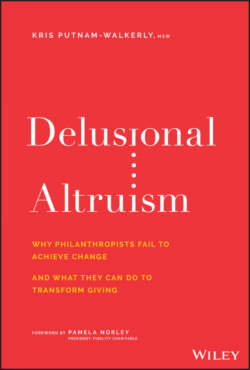Читать книгу Delusional Altruism - Kris Putnam-Walkerly - Страница 29
Fear of Learning You Aren't Right
ОглавлениеWe all want to be right. After all, we're smart people. In fact, we're brilliant. We've bought and sold businesses, trained to become professional musicians, and led nonprofit organizations. We might draw upon a lifetime of challenging experiences that help us deeply understand the strengths and needs of others. We may have graduated from elite universities or the school of hard knocks. Whatever our backgrounds, we know a lot. And we want to be right!
But many funders fear learning they aren't right. They don't want to find out they aren't as smart as they think when it comes to solving the world's problems. So they stop asking questions. They stop learning. They stop looking for better approaches to reaching their goal. This is a scarcity mind-set in action. A funder prefers to stay in denial rather than risk learning they're wrong. If they could overcome this fear and recognize ways they need to change, they would increase their ability to make an impact. But fear overcomes their desire to make a difference.
This happens to many professional athletes who want to give back to their community after retirement. Most want to create their own foundation, without fully appreciating how hard it is to manage a nonprofit organization, create and run quality programs, and raise funds to sustain it. There are lots of other options. You can create a donor-advised fund instead of starting a foundation. That way someone else can manage the back-office operations, stay on top of taxes and reporting, and issue the checks. Or instead of creating new programs, you can invest your resources to expand and strengthen existing ones.
Charles Way agrees this would be a good idea, but it doesn't take into account the vision that most professional athletes have for themselves. Way is a former National Football League (NFL) player with the New York Giants. After his retirement from football, he spent 15 years with the Giants as their director of Player Development, then was recruited to the NFL to become director of Player Engagement. He's now a managing partner with Purple Bridge Management. With the Giants and the NFL, he helped players prepare for life and career after football, including philanthropy. Says Way:
Sure, donor-advised funds would be a great solution. But not too many athletes know they exist and could be a better alternative to starting a foundation. It's also important to realize that, depending on the socioeconomic situation you come from, and the impact that situation had on you, oftentimes that determines how involved and passionate you are about that initiative. Which further fuels the desire to start a foundation—because from their experience, if they don't do something to make their community's situation better, then no one will.
In other words, they could benefit from learning that the approach they think they should take might not be best. There are alternative ways of giving back that might be better for you and more impactful for the communities you want to help. But it's hard to learn we might not be right.
It's easy to stay in our cocoons. We can hold tight to our beliefs and not fully understand the context of a problem or the scale of its solution. We often receive news via apps on our computers and smartphones, filtered to us via unknown algorithms that track what they think we want to know and feed us an increasingly narrow band of information. As a result, it's hard to learn from the opinions of people who have different cultural, political, or professional views.
Thankfully we aren't limited to what our devices tell us! We can learn from the people who are directly impacted by the issues we want to support. But too often we don't. For many, talking to “others” seems scary. So does hiring them or inviting them to join our boards. After all, we might learn we need to question our assumptions, or change the way we work. It's easier to base our philanthropic decisions on the decisions of other ultra-high-net-worth donors, academic research, and environmental scans. Rather than step foot in the blighted neighborhood we want to strengthen, we step into our offices and turn on our computers to learn.
